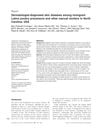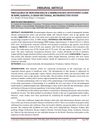 August 2023 in “Iranian Journal of Clinical Infectious Diseases”
August 2023 in “Iranian Journal of Clinical Infectious Diseases” Most skin issues were due to COVID-19, with some caused by vaccines or treatments, and were categorized into five types.
 January 2023 in “Dermatologic Therapy”
January 2023 in “Dermatologic Therapy” A new hand-held light therapy device was found to be safe and effective for treating mild-to-moderate acne.
 January 2012 in “Yearbook of Dermatology and Dermatologic Surgery”
January 2012 in “Yearbook of Dermatology and Dermatologic Surgery” Acne treatment, including isotretinoin, improves quality of life and does not worsen depression.
 152 citations,
December 2007 in “Gender Medicine”
152 citations,
December 2007 in “Gender Medicine” Male and female skin differ due to hormones, affecting conditions like hair loss, acne, and skin cancer, and suggesting a need for gender-specific treatments.
 151 citations,
December 2004 in “Annals of the New York Academy of Sciences”
151 citations,
December 2004 in “Annals of the New York Academy of Sciences” Congenital Adrenal Hyperplasia is a genetic disorder with two forms, causing symptoms like early puberty and severe acne, but can be identified through screening and treated with glucocorticoids.
 118 citations,
May 2015 in “European journal of pharmaceutics and biopharmaceutics”
118 citations,
May 2015 in “European journal of pharmaceutics and biopharmaceutics” The hydrogel with a 1:3 ratio of hydroxyethyl cellulose to hyaluronic acid is effective for delivering drugs through the skin to treat acne.
 108 citations,
December 2003 in “Lasers in surgery and medicine”
108 citations,
December 2003 in “Lasers in surgery and medicine” ICG-enhanced NIR laser therapy may be a promising acne treatment with improvement and no side effects.
 59 citations,
January 2015 in “Nanoscale”
59 citations,
January 2015 in “Nanoscale” The new micelle formulation delivers acne treatment more effectively and safely than current gels.
 48 citations,
July 2009 in “The Journal of Sexual Medicine”
48 citations,
July 2009 in “The Journal of Sexual Medicine” DHEA did not improve sexual function, well-being, or menopausal symptoms in postmenopausal women with low libido but caused side effects like acne and increased facial hair.
 46 citations,
May 2009 in “Maturitas”
46 citations,
May 2009 in “Maturitas” Taking DHEA for a year is generally safe for postmenopausal women but may cause acne and more facial hair without improving metabolism or aging.
 32 citations,
November 2018 in “Anais Brasileiros de Dermatologia”
32 citations,
November 2018 in “Anais Brasileiros de Dermatologia” In Brazil in 2018, the most common skin issues were acne, photoaging, and nonmelanoma skin cancer, with treatments often including topical medications and sunscreen.
 25 citations,
May 2003 in “Expert Opinion on Therapeutic Patents”
25 citations,
May 2003 in “Expert Opinion on Therapeutic Patents” Steroid Sulfatase inhibitors show promise in treating hormone-dependent disorders like cancers, hair loss, and acne, with 667COUMATE being a potential candidate for breast cancer treatment trials.
 22 citations,
January 2015 in “The Cochrane library”
22 citations,
January 2015 in “The Cochrane library” DHEA may help with sexual function when used intravaginally by menopausal women but is similar to hormone therapy in other aspects and might cause more side effects like acne and hair loss.
 21 citations,
June 2004 in “International Journal of Dermatology”
21 citations,
June 2004 in “International Journal of Dermatology” Most skin diseases in Hajjah, Yemen, were dermatitis, infections, and acne, influenced by local socioeconomic and environmental factors.
 19 citations,
May 2005 in “Archives of Environmental & Occupational Health”
19 citations,
May 2005 in “Archives of Environmental & Occupational Health” All immigrant workers in the study had skin problems, with fungal nail infections, athlete's foot, and acne or folliculitis being most common, affecting their quality of life, yet they didn't seek medical help.
 16 citations,
March 2013 in “International Journal of Dermatology”
16 citations,
March 2013 in “International Journal of Dermatology” Immigrant Latino workers in North Carolina, especially in poultry processing, often have skin diseases like fungal infections and acne.
 13 citations,
September 2011 in “American Journal of Clinical Dermatology”
13 citations,
September 2011 in “American Journal of Clinical Dermatology” The oral contraceptive ethinylestradiol/chlormadinone acetate is effective in reducing acne and improving other skin conditions related to high androgen levels.
 12 citations,
December 2017 in “Gynecological Endocrinology”
12 citations,
December 2017 in “Gynecological Endocrinology” About 5% of Thai university girls aged 17-19 have polycystic ovary syndrome, with moderate acne being a strong risk factor.
 10 citations,
October 2010 in “International Journal of Andrology”
10 citations,
October 2010 in “International Journal of Andrology” Finasteride doesn't affect oral testosterone undecanoate, and high DHT levels may cause acne, prostate issues, and hair loss.
 9 citations,
May 2021 in “Archives of Dermatological Research”
9 citations,
May 2021 in “Archives of Dermatological Research” Home-based skin care devices are generally safe and effective for hair removal, promoting hair growth, treating wrinkles and acne, but results for psoriasis treatment are mixed.
9 citations,
June 2020 in “Trials” The trial aims to test if spironolactone is an effective acne treatment for women without the side effects of current treatments.
 5 citations,
March 2020 in “Current Opinion in Endocrine and Metabolic Research”
5 citations,
March 2020 in “Current Opinion in Endocrine and Metabolic Research” Skin problems in PCOS, like excess hair, acne, and hair loss, may not always indicate high male hormone levels and need careful diagnosis for proper treatment.
2 citations,
October 2021 in “Journal of Cosmetic Dermatology” Finasteride is more effective and satisfactory than montelukast for treating moderate acne in women.
 1 citations,
January 2023 in “Journal of cosmetic dermatology”
1 citations,
January 2023 in “Journal of cosmetic dermatology” Combining CO2 laser with platelet-rich plasma is more effective for treating acne scars than laser alone.
 1 citations,
October 2013 in “Journal of Postgraduate Medical Institute”
1 citations,
October 2013 in “Journal of Postgraduate Medical Institute” Metformin helps improve menstrual irregularities and some hormone levels in PCOS patients, but not symptoms like excess hair, acne, or hair loss.
 March 2023 in “Bagcılar medical bulletin”
March 2023 in “Bagcılar medical bulletin” A young woman had a rare tumor causing high male hormone levels and symptoms like excessive hair and acne. After removing the tumor, her hormone levels returned to normal. Early diagnosis is important.
 June 2018 in “Journal of evolution of medical and dental sciences”
June 2018 in “Journal of evolution of medical and dental sciences” Skin problems like excessive hair growth, acne, and dark skin patches can be signs of Polycystic Ovarian Disease, which may also be linked to family history and a risk for diabetes.
 July 2015 in “Journal of evolution of medical and dental sciences”
July 2015 in “Journal of evolution of medical and dental sciences” The most common skin diseases found were contact dermatitis, scabies, fungal infections, urticaria, and acne, highlighting the need for better public health policies and awareness.
 11 citations,
January 1998 in “Dermatology”
11 citations,
January 1998 in “Dermatology” Spironolactone works well for acne and hirsutism, isotretinoin is very effective for acne and may have antiandrogenic effects, and 5 alpha-reductase inhibitors should be considered antiandrogens.
35 citations,
November 2021 in “Journal of nanobiotechnology” Thymol-loaded nanoparticles are a promising, natural treatment for acne that avoids antibiotics and preserves healthy skin bacteria.


























